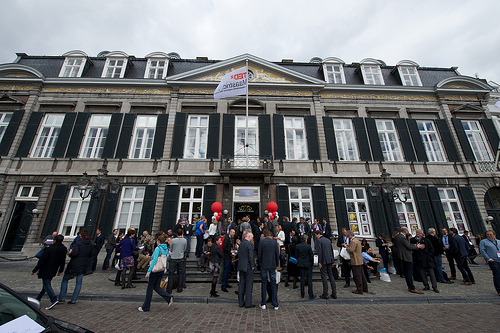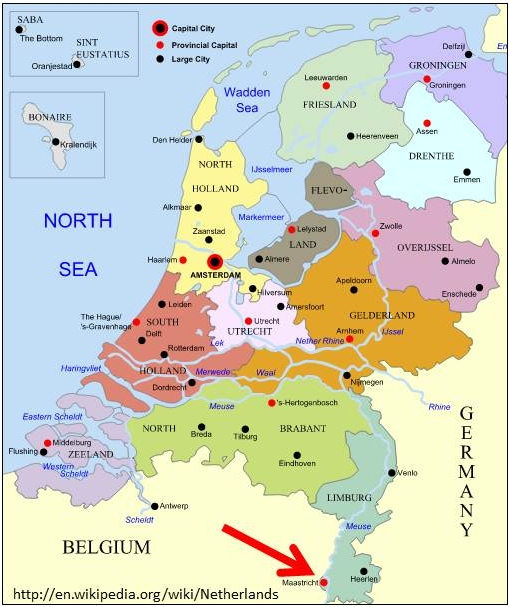
Welcome to Grand Rounds for May 10, 2011!
I have a confession: I’m new at this. My initial exposure to Grand Rounds a while back gave me a warped view, and as I worked on this project, I was a little bit graceless. (Those of you who wrote to me about it know what I mean. I meant well…)
This week’s theme is the TEDx Maastricht conference that happened April 4. But first –
These news highlights were submitted:
- Dr. Ed Pullen’s “Medical blog for the informed patient” is not thrilled about Vimovo, a new drug for osteoarthritis. Pullen believes in letting people know what’s going on behind the scenes.
- Two items from the American College of Physicians ACP Internist blog:
- Environmental diseases like asthma and lead poisoning are rising, even as government programs to reduce them are being cut. (What are they thinking??)
- Female heart attack patients are less likely to undergo surgery, and more likely to die when they do
- At the Health Business Blog, David Williams’ Rise of People Power, or Arrogance of the Academy? takes Nature to task – and rightly so – for publishing a commentary titled “The Rise of People Power” but hiding it behind a $32 paywall. (For a two page article!) It’s a good piece about the recent push by MS patients to pursue a new treatment; many in the establishment have been asking “Who are these people, just patients, trying to define our research priorities??” Who are they, indeed – just the ultimate stakeholder, with the most to lose.
And that leads naturally into our theme – the future of health, which is indeed being increasingly defined by the ultimate stakeholder: the patient. It’s about time!
TEDx Maastricht: The Future of Health
This event took place April 4 in the Dutch city of Maastricht (Wikipedia), which is pronounced like “Ma’s strict,” except the c is clearing its throat. It’s a lovely town, way down at the southern end of the Netherlands, between Belgium and Germany.

 Wikipedia says there’s argument about whether Maastricht is the oldest town in the country. The people who live there say it is.:) It’s also where the Maastricht Treaty was signed in 1992, leading to the European Union and the euro.
Wikipedia says there’s argument about whether Maastricht is the oldest town in the country. The people who live there say it is.:) It’s also where the Maastricht Treaty was signed in 1992, leading to the European Union and the euro.
In any case, in the steepletop photo above (click to enlarge), there’s a big plaza. And across that plaza is the beautiful 900 seat theater that hosted TEDx Maastricht – a day packed with great speeches and a couple of energizing dance performances.
Most people know about TED talks, at TED.com. TED talks are the Olympics of public speaking: you have nine or 18 minutes to blow people’s minds. (TED stands for technology, entertainment, and design, and the best TED talks combine all three.) Many people also know about TEDMED, the newer medical TED. Some of us from e-patients.net were at TEDMED 2010; our posts are linked from this one.
TEDx is a newer, smaller, local, franchised version. TEDx quality and event format aren’t as tightly controlled, but the one in Maastricht felt just like the real thing. Energy was high and execution was superb.
The day showed that the future of health is indeed patient driven. Speech after speech showed the new role patients are playing, as they increasingly take the reins in healthcare, partnering with their clinicians and sometimes even defining the goals of their treatments. There were so many great talks that I’ve selected some personal highlights and categorized them. The entire set – all 20 of them, six hours of video – is on YouTube here.
The Engaged Patient and Participatory Medicine
Regular readers know that I’m a big fan of the Society for Participatory Medicine, in which networked patients shift from being passive passengers to responsible drivers of their health. (Here are its blog and journal.) In Maastricht we got a boatload of evidence that people it’s a reality, and not just in the U.S.
Bas Bloem and patient: “From God to Guide”
For me the most stunning presentation of the day came from Bas Bloem, professor of neurology, who brought one of his actual patients(!) with him. He starts “on high” in a hydraulic lift, talking down to his patient, but the patient petitions him: “I want good and reliable information! I want to have part in making the decisions to start treatment or not! And, where can I find another patients like me? And what can I do to make things better?” Bloem begins to practice participatory medicine, figuratively – and literally – coming down from on high:
Ragna Vandenberg: “This is your captain speaking.”
In my speeches I often say “This is personal – your time will come.” Ragna knows it well: ten months before TEDx, this healthcare professional suffered a subarachnoid hemorrhage and is still battling back from the resulting sensory integration challenges. (Imagine if raindrops occurred for you as excrutiating noise.) “This is your captain speaking” is an inspiring, articulate tale of taking the reins in her own recovery – using the internet to connect with experts, and other patients like her. Here’s her own moving post about the story, and here’s the video:
Sophie van der Stap: “The Girl With Nine Wigs”
Sophie was 21 when she was diagnosed with a rare and nasty cancer. Watch the audience reaction as she says, “In a heartbeat, I went from a girl carrying her study books under one arm, carrying her cell phone in the other, to someone robbed of dreams and a future.”
Today she’s the author of the best-selling The Girl With Nine Wigs – and she brought them all on stage with her:
(Her attitude is amazing – she refers to chemo’s total-body hair loss as “a free and painless Brazilian wax”!)
Nicolette Mak: Purpose, Perception and Power
This powerhouse pulled herself out of the Dutch equivalent of a reform school and found purpose. She started ValidExpress, a postal express company for disabled customers. Check out her colleague who joins her near the end – paraplegic triathlete Maurice. “Am I disabled? No. I’m able.” Defining his life on his terms: that’s patient empowerment.
My talk: “Let Patients Help”
What can I say? This was the most fun I’ve ever had on stage.:)
“Big TED” speakers
It was a special privilege to hear from a couple of guys who get it and have hit it big on the big stage.
Daniel Kraft MD: “What’s next in healthcare?”
Daniel’s not just a “big TED” and TEDMED speaker; he’s involved with running TEDMED, and he’s the medical track chair for Singularity U in Silicon Valley, which this week is running FutureMed. Daniel is all about exponential technologies – his bet as a tech watcher is that as some medical technologies scale up, they’ll be game changers:
Simon Sinek: “First Why, and Then Trust”
Simon’s made a name for himself with “Start With Why,” and in Maastricht he took it to the next level:
Technology and Innovation
In addition to Daniel Kraft, several other tech-oriented speakers tickled my fancy.
Remco Hoogendijk: “The 7 sins of health care innovation”
A crowd favorite! What a hoot – this innovation consultant gelled his hair up into devil horns, and did a great rendition of satanic threats, starting with “Please allow me to introduce myself.” (Remco crowdsourced himself – he auditioned by video and was selected. A natural entertainer!)
Tim Hurson: “The Shock of the Possible”
This one’s so cool that the venerable Cory Doctorow wrote about it on BoingBoing, calling it “a great, impassioned rant about the power of the unexpected in innovation.” The video:
Wouter Bos: “Is technology the answer to the rising costs of healthcare?”
On the “party pooper” side (his term!), Bos is the Netherlands’ former Deputy Prime Minister and Finance Minister. He asks whether marvelous new technology will actually change the cost structure. His questions are valid, though I think he overlooks the solutions already being developed elsewhere.
Lawrence Sherman: “Turning medical education inside out and upside down”
At various times James Brown and Wayne Newton were described as “the hardest working man in show business.” At TEDx Maastricht it was Lawrence Sherman (@Meducate): from the moment he comes on stage, it’s obvious he used to be a stand-up comedian.:) He begs for applause and works his butt off, making the point that medical education must be more patient oriented:
Finally, from our curator –
Lucien Engelen (@Zorg20) was the vision and driving force behind this patient-centered event. The patient aspect was so important to him that when the conference was first announced last year, the very first speaker named was a patient. That’s a great precedent for others to follow.
Here’s a short video from the man himself. First, he describes how his university appointed a Chief Listening Officer (!), then introduces a slick, unconventional, but perfect example of how our gadgets are starting to enable really useful crowdsourcing – not of ideas, but of data:
The crowdsource trick is truly empowering ordinary people to improve emergency care: with this new app, when people notice an AED (defibrillator), they can upload its location – and then when someone needs an AED in a hurry, the app can tell them the closest one it knows.
In true crowdsource fashion, the more people use it, the more valuable it becomes. That’s what they call the law of networks. His post about it is here.
And that, ladies and gentlemen, is the future of health.



Amazing stories! I will be back often as I go through them. Thanks for sharing.
Fabulous GR, Dave. I missed the event, but am so glad you put this together. There’s a lot of serious information here, including the e-patient definition that I happened to be searching for today. And thanks for sharing the 1969 photo!
Dave –
Thanks so much for this wonderful summary of what seems like an amazing conference. Congrats on being asked to speak there!
Peggy
This is great Dave!
You say that you think that Bos has overlooked “the solutions already being developed elsewhere”. Could you say some more about that? The Netherlands and the UK both have relatively ‘socialised’ healthcare systems so I could understand his point of view and I thought it was a very real challenge to all those involved in decisions around healthcare, including patients. But I have seen very little discussion of it so I am particularly interested in your view.
Many thanks
AM
Thank you, Dave! Something here for everyone.
Thank you for your lectures on health care TEDx Maastrich has been a
wonderfull experience for me as a Parkinson’s patent and i have just had
DBS operation at Frenchy Hospital in Bristol By Professor Gill your programs on the net are wonderfull and i have been showing them to anyone who cares to see them.
Thank you
Bertie Hemphill
Bt94 1pe